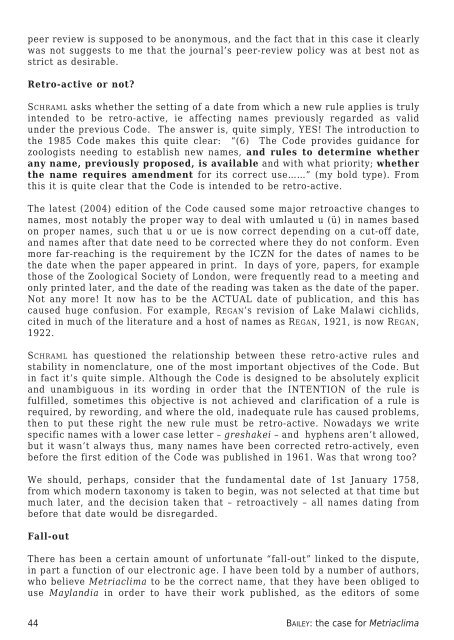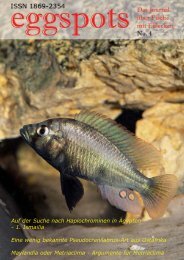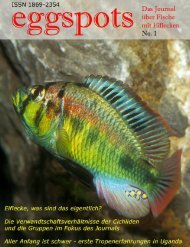Eggspots Elsewhere - Welt der Fische / World of Fishes
Eggspots Elsewhere - Welt der Fische / World of Fishes
Eggspots Elsewhere - Welt der Fische / World of Fishes
Create successful ePaper yourself
Turn your PDF publications into a flip-book with our unique Google optimized e-Paper software.
peer review is supposed to be anonymous, and the fact that in this case it clearly<br />
was not suggests to me that the journal’s peer-review policy was at best not as<br />
strict as desirable.<br />
Retro-active or not?<br />
SCHRAML asks whether the setting <strong>of</strong> a date from which a new rule applies is truly<br />
intended to be retro-active, ie affecting names previously regarded as valid<br />
un<strong>der</strong> the previous Code. The answer is, quite simply, YES! The introduction to<br />
the 1985 Code makes this quite clear: “(6) The Code provides guidance for<br />
zoologists needing to establish new names, and rules to determine whether<br />
any name, previously proposed, is available and with what priority; whether<br />
the name requires amendment for its correct use……” (my bold type). From<br />
this it is quite clear that the Code is intended to be retro-active.<br />
The latest (2004) edition <strong>of</strong> the Code caused some major retroactive changes to<br />
names, most notably the proper way to deal with umlauted u (ü) in names based<br />
on proper names, such that u or ue is now correct depending on a cut-<strong>of</strong>f date,<br />
and names after that date need to be corrected where they do not conform. Even<br />
more far-reaching is the requirement by the ICZN for the dates <strong>of</strong> names to be<br />
the date when the paper appeared in print. In days <strong>of</strong> yore, papers, for example<br />
those <strong>of</strong> the Zoological Society <strong>of</strong> London, were frequently read to a meeting and<br />
only printed later, and the date <strong>of</strong> the reading was taken as the date <strong>of</strong> the paper.<br />
Not any more! It now has to be the ACTUAL date <strong>of</strong> publication, and this has<br />
caused huge confusion. For example, REGAN’s revision <strong>of</strong> Lake Malawi cichlids,<br />
cited in much <strong>of</strong> the literature and a host <strong>of</strong> names as REGAN, 1921, is now REGAN,<br />
1922.<br />
SCHRAML has questioned the relationship between these retro-active rules and<br />
stability in nomenclature, one <strong>of</strong> the most important objectives <strong>of</strong> the Code. But<br />
in fact it’s quite simple. Although the Code is designed to be absolutely explicit<br />
and unambiguous in its wording in or<strong>der</strong> that the INTENTION <strong>of</strong> the rule is<br />
fulfilled, sometimes this objective is not achieved and clarification <strong>of</strong> a rule is<br />
required, by rewording, and where the old, inadequate rule has caused problems,<br />
then to put these right the new rule must be retro-active. Nowadays we write<br />
specific names with a lower case letter – greshakei – and hyphens aren’t allowed,<br />
but it wasn’t always thus, many names have been corrected retro-actively, even<br />
before the first edition <strong>of</strong> the Code was published in 1961. Was that wrong too?<br />
We should, perhaps, consi<strong>der</strong> that the fundamental date <strong>of</strong> 1st January 1758,<br />
from which mo<strong>der</strong>n taxonomy is taken to begin, was not selected at that time but<br />
much later, and the decision taken that – retroactively – all names dating from<br />
before that date would be disregarded.<br />
Fall-out<br />
There has been a certain amount <strong>of</strong> unfortunate “fall-out” linked to the dispute,<br />
in part a function <strong>of</strong> our electronic age. I have been told by a number <strong>of</strong> authors,<br />
who believe Metriaclima to be the correct name, that they have been obliged to<br />
use Maylandia in or<strong>der</strong> to have their work published, as the editors <strong>of</strong> some<br />
44 BAILEY: the case for Metriaclima




